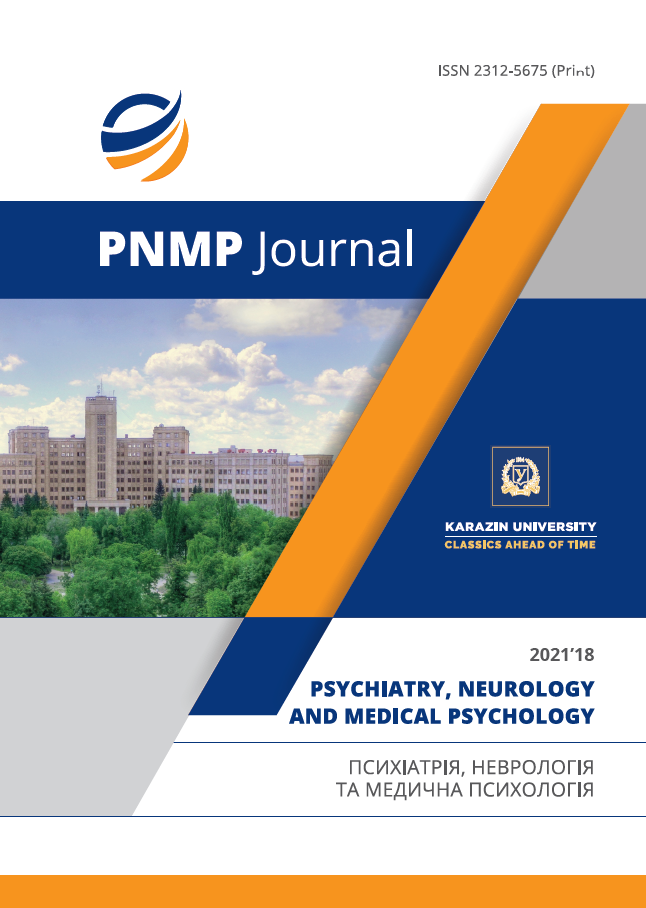The influence of the sleep disturbances on the quality of patients` life with anxiety-depressive disorders of neurotic and organic genesis
Abstract
The patients with anxiety-depressive disorders often complain about sleep disturbance. It is due to the high comorbidity of given disorders. They can mutually worsen the duration of each other, complicate the process of treatment and increase the risk of relapse further. Besides, sleep disorders can be preserved even after the compensation of the main disease, that can influence on the quality of life and patient`s social functioning. The goal of the actual research is the learning of the influence of the sleep disorders on the quality of life and patients` social functioning with anxiety-depressive disorders of neurotic and organic genesis. For achievement of the set goal it was explored 120 patients with anxiety-depressive disorders, who were divided into 4 groups depending on the genesis of the disease and the method of medical influence. The research was done with the help of clinic- psychopathology method, adding with Pittsburg index of the quality of the (PSQI), integrative index of the quality of life J Mezzich (the dyad of the patient and the doctor), methods of describing and analytical statistic. As a result of made research, the reverse correlation connections were detected between the sleep disorders and the indexes of the quality of the patient`s life. These connections were observed during the treatment. It was determined, that the combined treatment was the most effective, directed to the therapy of the main disease and directly the correction of the sleep of the patients with anxiety-depressive disorders of neurotic and organic genesis, in comparison with the patients who had a treatment of the main disease. Thus, especial attention must be paid to the correction of insomnia in the treatment of anxiety-depressive disorders with sleep disturbance.
Downloads
References
Robillard, R., Hermens, D., Naismith, S., White, D., Rogers, N., Ip, T., Mullin, S., Alvares, G., Guastella, A., Smith, K. L., Rong, Y., Whitwell, B., Southan, J., Glozier, N., Scott, E., & Hickie, I. Ambulatory sleep-wake patterns and variability in young people with emerging mental disorders. Journal of Psychiatry & Neuroscience. 2015. No. 40(1), pp. 28–37. https://doi.org/10.1503/jpn.130247
Klumpp, H., Roberts, J., Kapella, M. C., Kennedy, A. E., Kumar, A., & Phan, K. L. Subjective and objective sleep quality modulate emotion regulatory brain function in anxiety and depression. Depression and Anxiety. 2017. No. 34(7), pp. 651–660. https://doi.org/10.1002/da.22622
Laudon, M., & Frydman-Marom, A. Therapeutic Effects of Melatonin Receptor Agonists on Sleep and Comorbid Disorders. International Journal of Molecular Sciences. 2014. No. 15(9), pp. 15924–15950. https://doi.org/10.3390/ijms150915924
Pchelina, P. V., & Poluektov, M. G. Sleep Disorders and Anxiety. Effective pharmacotherapy. Neurology Special Issue "Sleep and its disorders - 5". 2017. No. 35, pp. 32-40.
Chaban O., Khaustova H., Asanova A., Trachuk l., Assonov D. Practical psychosomatics: diagnostic scales. Kiev: "Medkniga". 2019. 2nd edition. 112p.
Maruta N., Pan’ko T., Yavdak I., Semykina H., Kolyadko S., Kalenskaya G. A criterion for the quality of life in practical psychiatry. Kharkov. RIF Arsis. LTD. 2004. 240p.
Grjibovskiy A.M., Ivanov S.V., Gorbatova M.A. Analysis of quantitative data in two non-independent groups using Statistica and SPSS software: parametric and nonparametric tests. Science and Health Care. 2016. No. 5, pp. 5–29.

